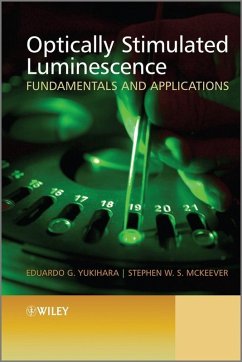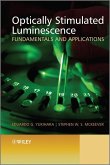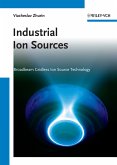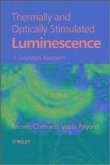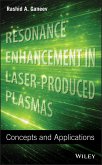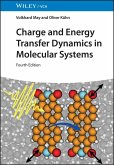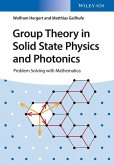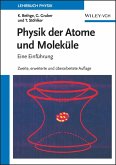Optically Stimulated Luminescence (eBook, ePUB)
Fundamentals and Applications


Alle Infos zum eBook verschenken

Optically Stimulated Luminescence (eBook, ePUB)
Fundamentals and Applications
- Format: ePub
- Merkliste
- Auf die Merkliste
- Bewerten Bewerten
- Teilen
- Produkt teilen
- Produkterinnerung
- Produkterinnerung

Hier können Sie sich einloggen

Bitte loggen Sie sich zunächst in Ihr Kundenkonto ein oder registrieren Sie sich bei bücher.de, um das eBook-Abo tolino select nutzen zu können.
Optically stimulated luminescence has developed into one of the leading optical techniques for the measurement and detection of ionizing radiation. This text covers, in a readable manner, advanced modern applications of the technique, how it can play a useful role in different areas of dosimetry and how to approach the challenges presented when working with optically stimulated luminescence. The six chapters are as follows: * Introduction, including a short history of OSL and details of successful applications * Theory and Practical Aspects * Personal Dosimetry * Space Dosimetry * Medical…mehr
- Geräte: eReader
- mit Kopierschutz
- eBook Hilfe
- Größe: 8.15MB
![Optically Stimulated Luminescence (eBook, PDF) Optically Stimulated Luminescence (eBook, PDF)]() Eduardo G. YukiharaOptically Stimulated Luminescence (eBook, PDF)117,99 €
Eduardo G. YukiharaOptically Stimulated Luminescence (eBook, PDF)117,99 €![Industrial Ion Sources (eBook, ePUB) Industrial Ion Sources (eBook, ePUB)]() Viacheslav V. ZhurinIndustrial Ion Sources (eBook, ePUB)129,99 €
Viacheslav V. ZhurinIndustrial Ion Sources (eBook, ePUB)129,99 €![Thermally and Optically Stimulated Luminescence (eBook, ePUB) Thermally and Optically Stimulated Luminescence (eBook, ePUB)]() Reuven ChenThermally and Optically Stimulated Luminescence (eBook, ePUB)112,99 €
Reuven ChenThermally and Optically Stimulated Luminescence (eBook, ePUB)112,99 €![Resonance Enhancement in Laser-Produced Plasmas (eBook, ePUB) Resonance Enhancement in Laser-Produced Plasmas (eBook, ePUB)]() Rashid A. GaneevResonance Enhancement in Laser-Produced Plasmas (eBook, ePUB)148,99 €
Rashid A. GaneevResonance Enhancement in Laser-Produced Plasmas (eBook, ePUB)148,99 €![Charge and Energy Transfer Dynamics in Molecular Systems (eBook, ePUB) Charge and Energy Transfer Dynamics in Molecular Systems (eBook, ePUB)]() Volkhard MayCharge and Energy Transfer Dynamics in Molecular Systems (eBook, ePUB)156,99 €
Volkhard MayCharge and Energy Transfer Dynamics in Molecular Systems (eBook, ePUB)156,99 €![Group Theory in Solid State Physics and Photonics (eBook, ePUB) Group Theory in Solid State Physics and Photonics (eBook, ePUB)]() Wolfram HergertGroup Theory in Solid State Physics and Photonics (eBook, ePUB)93,99 €
Wolfram HergertGroup Theory in Solid State Physics and Photonics (eBook, ePUB)93,99 €![Physik der Atome und Moleküle (eBook, ePUB) Physik der Atome und Moleküle (eBook, ePUB)]() Klaus BethgePhysik der Atome und Moleküle (eBook, ePUB)61,99 €
Klaus BethgePhysik der Atome und Moleküle (eBook, ePUB)61,99 €-
-
-
Dieser Download kann aus rechtlichen Gründen nur mit Rechnungsadresse in A, B, BG, CY, CZ, D, DK, EW, E, FIN, F, GR, HR, H, IRL, I, LT, L, LR, M, NL, PL, P, R, S, SLO, SK ausgeliefert werden.
- Produktdetails
- Verlag: Wiley-ISTE
- Seitenzahl: 378
- Erscheinungstermin: 18. Februar 2011
- Englisch
- ISBN-13: 9780470977217
- Artikelnr.: 37301232
- Verlag: Wiley-ISTE
- Seitenzahl: 378
- Erscheinungstermin: 18. Februar 2011
- Englisch
- ISBN-13: 9780470977217
- Artikelnr.: 37301232
- Herstellerkennzeichnung Die Herstellerinformationen sind derzeit nicht verfügbar.
Acknowledgments xiii
Disclaimer xiv
List of Acronyms xv
1 Introduction 1
1.1 A Short History of Optically Stimulated Luminescence 1
1.2 Brief Description of Successful Applications 7
1.2.1 Personal 7
1.2.2 Space 8
1.2.3 Medical 9
1.2.4 Security 10
1.3 The Future 10
2 Theory and Practical Aspects 13
2.1 Introduction 13
2.2 Basic Aspects of the OSL Phenomenon 17
2.2.1 Energy Levels in Perfect Crystals 17
2.2.2 Defects in the Crystal 18
2.2.3 Excitation of the Crystal by Ionizing Radiation 19
2.2.4 Trapping and Recombination at Defect Levels 22
2.2.5 Thermal Stimulation of Trapped Charges 24
2.2.6 Optical Stimulation of Trapped Charges 25
2.2.7 The Luminescence Process 27
2.2.8 Rate Equations for OSL and TL Processes 33
2.2.9 Temperature Dependence of the OSL Signal 40
2.2.10 Other OSL Models 44
2.3 OSL Readout 47
2.3.1 Basic Elements of an OSL Reader 47
2.3.2 Stimulation Modalities 48
2.4 Instrumentation 58
2.4.1 Light Sources 59
2.4.2 Light Detectors 63
2.4.3 Optical Filters 67
2.4.4 Light Collection 69
2.4.5 Sample Heaters 69
2.5 Available OSL Readers 70
2.5.1 Experimental Arrangements 70
2.5.2 Automated Research Readers 71
2.5.3 Commercial Dosimetry Readers 73
2.5.4 Optical Fiber Systems 74
2.5.5 Imaging Systems 75
2.5.6 Portable OSL Readers 76
2.6 Complementary Techniques 76
2.6.1 OSL Emission and Stimulation Spectrum 76
2.6.2 Lifetime and Time-Resolved OSL Measurements 78
2.6.3 Correlations Between OSL and TL 78
2.6.4 Other Phenomena 82
2.7 Overview of OSL Materials 82
2.7.1 Artificial Materials 85
2.7.2 Natural Materials 95
2.7.3 Electronic Components 98
2.7.4 Other OSL Materials and Material Needs 98
3 Personal Dosimetry 101
3.1 Introduction 101
3.2 Quantities of Interest 102
3.2.1 Absorbed Dose and Other Physical Quantities 103
3.2.2 Protection Quantities 108
3.2.3 Operational Quantities 110
3.3 Dosimetry Considerations 111
3.3.1 Definitions 111
3.3.2 Dose Calculation Algorithm 114
3.3.3 Reference Calibration Fields for Personal and Area Dosimeters 118
3.3.4 Uncertainty Analysis and Expression of Uncertainty 119
3.4 Detectors 123
3.4.1 General Characteristics 123
3.4.2 Al 2 O 3 :C Detectors 129
3.4.3 BeO Detectors 140
3.5 Dosimetry Systems 143
3.5.1 Luxel+ Dosimetry System 143
3.5.2 InLight Dosimetry System 146
3.6 Neutron-Sensitive OSL Detectors 150
3.6.1 Development of Neutron-Sensitive OSL Detectors 151
3.6.2 Properties of OSLN Detectors 154
3.6.3 Ionization Density Effects 157
4 Space Dosimetry 163
4.1 Introduction 163
4.2 Space Radiation Environment 165
4.2.1 Galactic Cosmic Rays (GCR) 165
4.2.2 Earth's Radiation Belts (ERB) 167
4.2.3 Solar Particle Events (SPEs) 171
4.2.4 Secondary Radiation 173
4.3 Quantities of Interest 174
4.3.1 Absorbed dose, d 174
4.3.2 Dose Equivalent, H 175
4.3.3 Equivalent Dose, H T 175
4.3.4 Effective Dose, E 176
4.3.5 Gray-Equivalent, G T 176
4.4 Health Risk 177
4.5 Evaluation of Dose in Space Radiation Fields Using OSLDs (and TLDs) 178
4.5.1 The Calibration Problem for Space Radiation Fields 178
4.5.2 Thermoluminescence, TL 182
4.5.3 Optically Stimulated Luminescence, OSL 188
4.5.4 OSL Response in Mixed Fields 197
4.6 Applications 206
4.6.1 Use of OSLDs (and TLDs) in Space-Radiation Fields 206
4.6.2 Example Applications 209
4.7 Future Directions 216
5 Medical Dosimetry 219
5.1 Introduction 219
5.2 Radiation Fields in Medical Dosimetry 223
5.2.1 Diagnostic Radiology 223
5.2.2 Radiation Therapy and Radiosurgery 227
5.2.3 Proton and Heavy-Ion Therapy 232
5.3 Practical OSL Aspects Applied to Medical Dosimetry 234
5.3.1 A Proposed Formalism 234
5.3.2 Calibration and Readout Protocols 238
5.3.3 A Checklist for Reporting OSL Results 246
5.4 Optical-Fiber OSL Systems for Real-time Dosimetry 247
5.4.1 Basic Concept 247
5.4.2 Optical-Fiber OSL System Designs and Materials 249
5.4.3 Readout Approaches 253
5.5 Properties of Al 2 O 3 :C OSL Detectors for Medical Applications 260
5.5.1 Influence Factors and Correction Factors 261
5.5.2 Correction Factors for Beam Quality 265
5.6 Clinical Applications 269
5.6.1 Quality Assurance in External Beam Radiation Therapy 269
5.6.2 Brachytherapy 271
5.6.3 Measurement of Dose Profiles in X-ray Computed Tomography (CT) 272
5.6.4 Proton Therapy 274
5.6.5 Fluoroscopy (Patient and Staff Dosimetry) 276
5.6.6 Mammography 277
5.6.7 Out-of-field Dose Assessment in Radiotherapy 278
5.6.8 Dose Mapping 278
5.6.9 Final Remarks on Clinical Applications 279
6 Other Applications and Concepts 281
6.1 Introduction 281
6.2 Retrospective and Accident Dosimetry 281
6.2.1 Basic Considerations 284
6.2.2 Methodological Aspects 285
6.2.3 Building Materials 289
6.2.4 Household Materials 294
6.2.5 Electronic Components 295
6.2.6 Dental Enamel and Dental Ceramics 299
6.3 Environmental Monitoring 306
6.4 UV Dosimetry 309
6.5 Integrated Sensors 311
6.6 Passive/Active Devices 314
6.7 Other Potential Security Applications 315
References 317
Index 355
Acknowledgments xiii
Disclaimer xiv
List of Acronyms xv
1 Introduction 1
1.1 A Short History of Optically Stimulated Luminescence 1
1.2 Brief Description of Successful Applications 7
1.2.1 Personal 7
1.2.2 Space 8
1.2.3 Medical 9
1.2.4 Security 10
1.3 The Future 10
2 Theory and Practical Aspects 13
2.1 Introduction 13
2.2 Basic Aspects of the OSL Phenomenon 17
2.2.1 Energy Levels in Perfect Crystals 17
2.2.2 Defects in the Crystal 18
2.2.3 Excitation of the Crystal by Ionizing Radiation 19
2.2.4 Trapping and Recombination at Defect Levels 22
2.2.5 Thermal Stimulation of Trapped Charges 24
2.2.6 Optical Stimulation of Trapped Charges 25
2.2.7 The Luminescence Process 27
2.2.8 Rate Equations for OSL and TL Processes 33
2.2.9 Temperature Dependence of the OSL Signal 40
2.2.10 Other OSL Models 44
2.3 OSL Readout 47
2.3.1 Basic Elements of an OSL Reader 47
2.3.2 Stimulation Modalities 48
2.4 Instrumentation 58
2.4.1 Light Sources 59
2.4.2 Light Detectors 63
2.4.3 Optical Filters 67
2.4.4 Light Collection 69
2.4.5 Sample Heaters 69
2.5 Available OSL Readers 70
2.5.1 Experimental Arrangements 70
2.5.2 Automated Research Readers 71
2.5.3 Commercial Dosimetry Readers 73
2.5.4 Optical Fiber Systems 74
2.5.5 Imaging Systems 75
2.5.6 Portable OSL Readers 76
2.6 Complementary Techniques 76
2.6.1 OSL Emission and Stimulation Spectrum 76
2.6.2 Lifetime and Time-Resolved OSL Measurements 78
2.6.3 Correlations Between OSL and TL 78
2.6.4 Other Phenomena 82
2.7 Overview of OSL Materials 82
2.7.1 Artificial Materials 85
2.7.2 Natural Materials 95
2.7.3 Electronic Components 98
2.7.4 Other OSL Materials and Material Needs 98
3 Personal Dosimetry 101
3.1 Introduction 101
3.2 Quantities of Interest 102
3.2.1 Absorbed Dose and Other Physical Quantities 103
3.2.2 Protection Quantities 108
3.2.3 Operational Quantities 110
3.3 Dosimetry Considerations 111
3.3.1 Definitions 111
3.3.2 Dose Calculation Algorithm 114
3.3.3 Reference Calibration Fields for Personal and Area Dosimeters 118
3.3.4 Uncertainty Analysis and Expression of Uncertainty 119
3.4 Detectors 123
3.4.1 General Characteristics 123
3.4.2 Al 2 O 3 :C Detectors 129
3.4.3 BeO Detectors 140
3.5 Dosimetry Systems 143
3.5.1 Luxel+ Dosimetry System 143
3.5.2 InLight Dosimetry System 146
3.6 Neutron-Sensitive OSL Detectors 150
3.6.1 Development of Neutron-Sensitive OSL Detectors 151
3.6.2 Properties of OSLN Detectors 154
3.6.3 Ionization Density Effects 157
4 Space Dosimetry 163
4.1 Introduction 163
4.2 Space Radiation Environment 165
4.2.1 Galactic Cosmic Rays (GCR) 165
4.2.2 Earth's Radiation Belts (ERB) 167
4.2.3 Solar Particle Events (SPEs) 171
4.2.4 Secondary Radiation 173
4.3 Quantities of Interest 174
4.3.1 Absorbed dose, d 174
4.3.2 Dose Equivalent, H 175
4.3.3 Equivalent Dose, H T 175
4.3.4 Effective Dose, E 176
4.3.5 Gray-Equivalent, G T 176
4.4 Health Risk 177
4.5 Evaluation of Dose in Space Radiation Fields Using OSLDs (and TLDs) 178
4.5.1 The Calibration Problem for Space Radiation Fields 178
4.5.2 Thermoluminescence, TL 182
4.5.3 Optically Stimulated Luminescence, OSL 188
4.5.4 OSL Response in Mixed Fields 197
4.6 Applications 206
4.6.1 Use of OSLDs (and TLDs) in Space-Radiation Fields 206
4.6.2 Example Applications 209
4.7 Future Directions 216
5 Medical Dosimetry 219
5.1 Introduction 219
5.2 Radiation Fields in Medical Dosimetry 223
5.2.1 Diagnostic Radiology 223
5.2.2 Radiation Therapy and Radiosurgery 227
5.2.3 Proton and Heavy-Ion Therapy 232
5.3 Practical OSL Aspects Applied to Medical Dosimetry 234
5.3.1 A Proposed Formalism 234
5.3.2 Calibration and Readout Protocols 238
5.3.3 A Checklist for Reporting OSL Results 246
5.4 Optical-Fiber OSL Systems for Real-time Dosimetry 247
5.4.1 Basic Concept 247
5.4.2 Optical-Fiber OSL System Designs and Materials 249
5.4.3 Readout Approaches 253
5.5 Properties of Al 2 O 3 :C OSL Detectors for Medical Applications 260
5.5.1 Influence Factors and Correction Factors 261
5.5.2 Correction Factors for Beam Quality 265
5.6 Clinical Applications 269
5.6.1 Quality Assurance in External Beam Radiation Therapy 269
5.6.2 Brachytherapy 271
5.6.3 Measurement of Dose Profiles in X-ray Computed Tomography (CT) 272
5.6.4 Proton Therapy 274
5.6.5 Fluoroscopy (Patient and Staff Dosimetry) 276
5.6.6 Mammography 277
5.6.7 Out-of-field Dose Assessment in Radiotherapy 278
5.6.8 Dose Mapping 278
5.6.9 Final Remarks on Clinical Applications 279
6 Other Applications and Concepts 281
6.1 Introduction 281
6.2 Retrospective and Accident Dosimetry 281
6.2.1 Basic Considerations 284
6.2.2 Methodological Aspects 285
6.2.3 Building Materials 289
6.2.4 Household Materials 294
6.2.5 Electronic Components 295
6.2.6 Dental Enamel and Dental Ceramics 299
6.3 Environmental Monitoring 306
6.4 UV Dosimetry 309
6.5 Integrated Sensors 311
6.6 Passive/Active Devices 314
6.7 Other Potential Security Applications 315
References 317
Index 355
